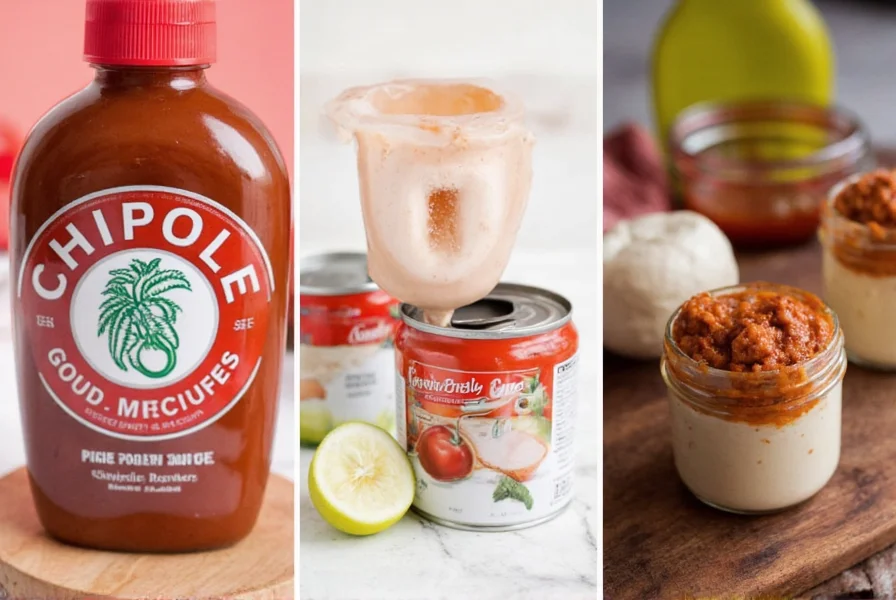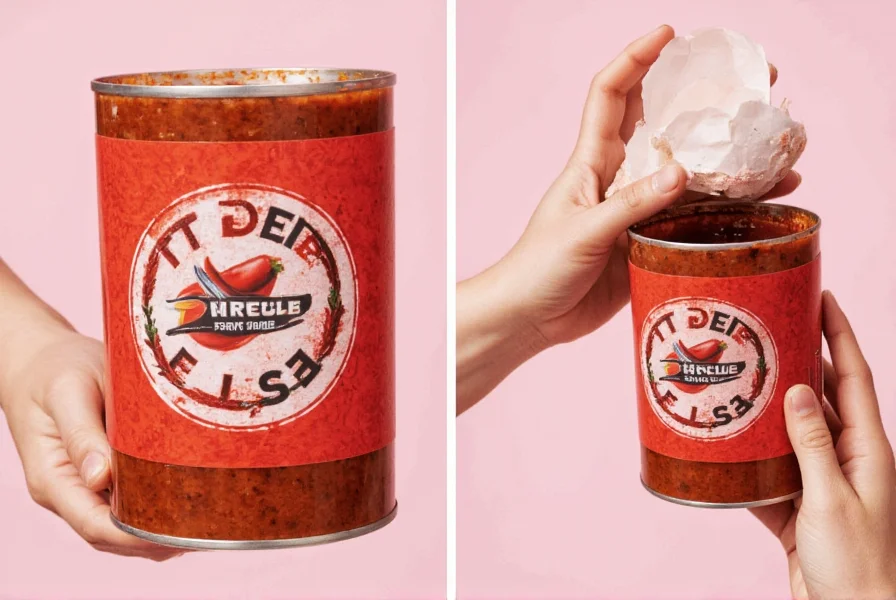Chipotle sauce is a smoky, spicy condiment made from smoked jalapeño peppers, typically packed in a tangy adobo sauce. This versatile ingredient adds depth to dishes like tacos, soups, and marinades, and is a pantry staple for many home cooks.
In this comprehensive guide, we’ll walk you through everything from understanding the basics to choosing the best brands and using chipotle sauce in creative ways. Whether you’re a seasoned pro or a curious home cook, by the end of this article, you’ll be reaching for that can with confidence — and maybe even flair.
Table of Contents
- What Exactly Is Chipotle Sauce?
- Why You Should Be Using It (Spoiler: Flavor, Shelf Life, and Versatility)
- How to Choose the Best Can of Chipotle Sauce
- Top 5 Brands Compared: Who Wins the Smoky Standoff?
- 5 Genius Ways to Use Chipotle Sauce in Your Cooking
- Ultimate Buying Guide: Know Your Chipotle Sauce Before You Buy
- Frequently Asked Questions
- Final Thoughts: Don’t Let That Can Go Unused!
What Exactly Is Chipotle Sauce?
At its core, chipotle sauce is made from dried, smoked jalapeño peppers. The word "chipotle" comes from the Nahuatl word "chilpoctli," which translates to "smoked chili." Unlike fresh chilies, chipotles have an earthy, rich heat with a touch of sweetness that only develops through the smoking process.
Most canned chipotle sauces come packed in adobo sauce — a tangy, tomato-based mixture infused with garlic, vinegar, and spices. This makes it not just a heat source but also a complex flavor booster for salsas, marinades, soups, and more.
Why You Should Be Using It
- Flavor Explosion: Smoky, spicy, slightly sweet — chipotle brings layers of taste that elevate everything it touches.
- Shelf-Stable Powerhouse: Keep a few cans in the pantry and you’re always one stir away from gourmet-level meals.
- Versatile Magic: From tacos to burgers, aioli to dressings, chipotle sauce adapts like a culinary ninja.
How to Choose the Best Can of Chipotle Sauce
| Factor | Description | What to Look For |
|---|---|---|
| Heat Level | Mild to fiery hot — depends on pepper maturity and concentration. | Read labels carefully. Some brands blend in milder ingredients; others pack real punch. |
| Ingredients List | Shorter lists usually mean purer products. | Avoid artificial preservatives or high-fructose corn syrup if possible. |
| Texture | Smooth vs chunky can make or break a dish. | Choose based on use case — smooth works better for dressings, chunky adds texture to tacos. |
| Packaging | Some come in resealable jars, others in single-use cans. | Jars may offer convenience for frequent users; cans are budget-friendly for occasional cooks. |
Top 5 Brands Compared: Who Wins the Smoky Standoff?

We rounded up five popular chipotle sauce products and tested them side-by-side across several key criteria. Here’s our breakdown:
| Brand | Heat Level | Texture | Best For | Price Range |
|---|---|---|---|---|
| Mex Gourmet Chipotle | Moderate | Chunky | Tacos, burritos, grilled meats | $ |
| La Costeña Chipotle | Medium-Hot | Smooth | Dips, dressings, marinades | $$ |
| Hatch Valley Chipotle | Hot | Chunky | Stews, chili, roasted veggies | $$ |
| Rosita Chipotle | Mild | Very Smooth | Delicate dishes, sauces, kids’ meals | $ |
| Frontera Chipotle | Spicy | Semi-Smooth | Chef-style cooking, bold recipes | $$$ |
5 Genius Ways to Use Chipotle Sauce in Your Cooking
- Upgrade Your Mayo: Mix a spoonful into mayonnaise for a smoky-spicy sandwich spread that steals the show.
- DIY BBQ Sauce: Combine with ketchup, brown sugar, vinegar, and Worcestershire for a homemade version that kicks store-bought to the curb.
- Spice Up Grilled Cheese: A dash in the cheese layer adds complexity that will make your kids ask, "Is this fancy?"
- Boost Baked Beans: Stir into baked beans before baking — the smokiness harmonizes beautifully with the sweetness.
- Elevate Tuna Salad: Replace some mayo with chipotle sauce for a lunch that actually excites.
Ultimate Buying Guide: Know Your Chipotle Sauce Before You Buy
Let’s go deeper than the shelf talkers and dive into what really matters when picking your next can of chipotle sauce.
Understanding Labels
- "Adobo Sauce" – Usually means the chipotles are packed in a flavorful tomato-garlic-vinegar base. Great for instant depth in sauces.
- "Whole Chipotles" – Often found in jars. These can be blended or chopped for custom heat levels.
- "In Puree" – Already blended for convenience. Perfect for adding to soups or dips without extra prep.
Storage Tips

- Once opened, store in an airtight container in the fridge for up to two weeks.
- Freeze in ice cube trays for longer shelf life — great for portion control!
- Keep whole chipotles submerged in their sauce to preserve flavor and texture.
Best Brands & Their Uses
| Brand | Best Use Case | Who’s It For? | Occasion |
|---|---|---|---|
| Mex Gourmet | Taco Tuesday essentials | Home cooks, families | Weeknight dinners |
| La Costeña | Marinades and dressings | Foodies, health-conscious eaters | Healthy meal prep |
| Hatch Valley | Hearty stews and roasts | Meat lovers, slow-cooking enthusiasts | Comfort food nights |
| Rosita | Mild flavor enhancement | Parents, mild spice fans | Kids’ meals, family gatherings |
| Frontera | Chef-inspired dishes | Professional chefs, gourmet experimenters | Dinner parties, special occasions |
Frequently Asked Questions
Got questions about using that can of chipotle sauce in your pantry? We’ve got answers to the most common queries:
How long does opened chipotle sauce last in the refrigerator?
Properly stored in an airtight container, opened chipotle sauce will stay fresh for 10-14 days in the refrigerator. Always keep the peppers submerged in their liquid to prevent drying out. For longer storage, freeze in ice cube trays then transfer to freezer bags — it will maintain quality for up to 6 months.
Can I reduce the heat level of chipotle sauce in my recipes?
Absolutely. Start with half the amount called for, then taste and adjust. Remove seeds and inner membranes from whole chipotles before blending, as these contain most heat. Balance spiciness by adding dairy (sour cream, yogurt) or sweetness (honey, maple syrup) to your dish. Remember that heat intensifies as sauces simmer, so add gradually near the end of cooking.
What’s the difference between chipotle sauce and adobo sauce?
Chipotle sauce refers to the finished product made from blended smoked jalapeños, while adobo sauce is the tangy tomato-vinegar base they’re packed in. Many "chipotle in adobo" products contain both — whole smoked peppers preserved in the adobo mixture. When recipes call for "chipotle sauce," they typically mean the blended product, whereas "chipotles in adobo" means the whole peppers with their packing sauce.
Is canned chipotle sauce gluten-free and vegan?
Most traditional chipotle sauces are naturally gluten-free and vegan, containing just smoked peppers, tomatoes, vinegar, garlic and spices. However, always check labels for additives like Worcestershire sauce (contains anchovies) or thickeners. Brands like Mex Gourmet and La Costeña offer certified gluten-free options. For vegan certainty, look for products without fish sauce or honey.
Can I make my own chipotle sauce from dried chipotle peppers?
Yes! Rehydrate 3-4 dried chipotle peppers in hot water for 20 minutes. Blend with ¼ cup tomato sauce, 1 minced garlic clove, 1 tsp vinegar, and 2 tbsp water until smooth. This gives you control over heat level and ingredients. For authentic adobo flavor, add ½ tsp oregano and a pinch of cumin. The homemade version won’t last as long as canned, so use within 5 days.
Final Thoughts: Don’t Let That Can Go Unused!
The beauty of the can of chipotle sauce lies in its simplicity and versatility. Once you get familiar with the nuances between brands and textures, you’ll find yourself reaching for it again and again. Whether you’re jazzing up leftovers, spicing up a dip, or crafting a signature marinade, chipotle sauce is your ticket to bold flavors without breaking a sweat.
So don’t let that can collect dust. Crack it open, blend it in, slather it on — and let your kitchen sing with smoky soul.










 浙公网安备
33010002000092号
浙公网安备
33010002000092号 浙B2-20120091-4
浙B2-20120091-4